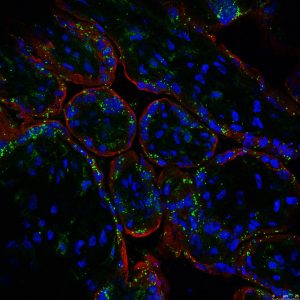Question: How does maternal obesity alter placental fatty acid metabolism?

Answer: Surprisingly, maternal obesity alters placental fatty acid storage and oxidation more strongly than uptake. Studying 80 women, we have found that placentas from women with a pre-pregnancy BMI >30 kg/m² (considered obese by the Institute of Medicine guidelines) preferentially store lipids once taken up into the tissue as compared to women with a BMI <25 kg/m².
Surprises: Though overall oxidation (for energy production) is not different from non-obese women, fatty acid uptake into the mitochondria are impaired, and other organelles must take over these initial steps to maintain normal function.
So what: These changes in placental lipid handling in obese women could alter the amount of lipid the fetus receives during development, perhaps protecting the fetus from excess lipid. On the other hand, the build-up of lipids within the placenta leave this tissue at risk for inflammation and oxidative stress (aka lipotoxicity), which could impair other pathways.
Follow-up: We now need to better understand the mechanisms underlying these changes in metabolism, and how they affect fetal lipid delivery. Our most recent study (see Rasool et al) showed that placental lipid metabolism was impacted by maternal obesity as early as 6 weeks of pregnancy!
Reference:
**Chosen for Endocrinology’s Best of 2017 Special Collection!! See our video summarizing the findings here.
